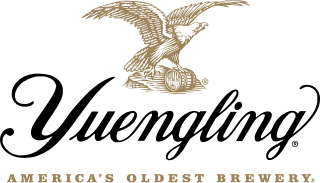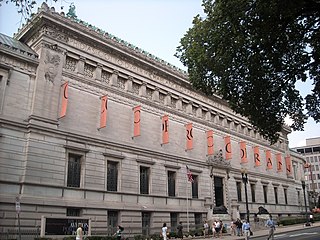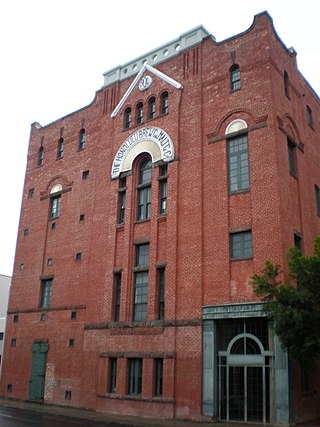
The Coors Brewing Company is an American brewery and beer company based in Golden, Colorado that was founded in 1873. In 2005, Adolph Coors Company, the holding company that owned Coors Brewing, merged with Molson, Inc. to become Molson Coors. The first Coors brewery location in Golden, Colorado is the largest single brewing facility operating in the world.

D. G. Yuengling & Son, established in 1829, is the oldest operating brewing company in the United States. In 2018, by volume of sales, it was the largest craft brewery, sixth largest overall brewery and largest wholly American-owned brewery in the United States. Its headquarters are in Pottsville, Pennsylvania. In 2015, Yuengling produced about 2.9 million barrels, operating two Pennsylvania facilities and a brewery in Tampa, Florida.

The Joseph Schlitz Brewing Company was an American brewery based in Milwaukee, Wisconsin, and once the largest producers of beer in the United States. Its namesake beer, Schlitz, was known as "The beer that made Milwaukee famous" and was advertised with the slogan "When you're out of Schlitz, you're out of beer". Schlitz first became the largest beer producer in the US in 1902 and enjoyed that status at several points during the first half of the 20th century, exchanging the title with Anheuser-Busch multiple times during the 1950s.

Foggy Bottom is a neighborhood of Washington, D.C., located in Northwest D.C. Stretching west of the White House towards the Potomac River, the neighborhood is home to numerous federal agencies and international institutions, while the core of the neighborhood is occupied by George Washington University.

Sleeman Breweries is a Japanese-owned Canadian brewery founded by John Warren Sleeman in 1988 in Guelph, Ontario. The company is the third-largest brewing company in Canada. Along with its own Sleeman brands, the company produces under licence the Stroh's family of brands, Maclays Ale and Sapporo Premium beers for sale in Canada. The company's parent Sapporo owns 4.2 per cent of Ontario's primary beer retailer The Beer Store.

Pittsburgh Brewing Company is a beer company headquartered in the Lawrenceville neighborhood of Pittsburgh, Pennsylvania, United States best known for producing brands such as Iron City Beer, I.C. Light Beer, I.C. Light Mango, Old German, and Block House Brewing. Until August 2009, all production was conducted at its Lawrenceville facility. From August 2009-2021, their products were contract brewed at City Brewing Company in the facility once produced Rolling Rock. On February 4, 2021, Iron City Beer's Instagram account announced that Pittsburgh Brewing Company would resume production of its own product in a new production brewery in Creighton, Pennsylvania, in the original Pittsburgh Plate Glass Company plant. At its opening, the facility is capable of producing 150,000 BBLs of beer annually.

The Pabst Brewing Company is an American company that dates its origins to a brewing company founded in 1844 by Jacob Best and was, by 1889, named after Frederick Pabst. It is currently a holding company which contracts the brewing of over two dozen brands of beer and malt liquor: these include its own flagship Pabst Blue Ribbon, as well as brands from now defunct breweries including:

Genesee Brewing Company is an American brewery located along the Genesee River in Rochester, New York. From 2000 to 2009, the company was known as the High Falls Brewing Company. In 2009, High Falls was acquired by the capital investment firm KPS Capital. Together with newly acquired Labatt USA, KPS merged the two companies as North American Breweries. Along with this change, High Falls Brewery changed its name back to the original "Genesee Brewing Company" operating under the North American Breweries name. In October 2012, North American Breweries was purchased by FIFCO

The Christian Heurich Brewing Company was a Washington, D.C., brewery founded in 1872 and incorporated by Christian Heurich in 1890. First located near Dupont Circle on 20th Street NW, it expanded to a much larger site in Foggy Bottom in 1895 after a major fire. The new brewery was located along the Potomac River at 26th Street and D Street NW, where the John F. Kennedy Center for the Performing Arts now stands. The Heurich brewery was the largest in Washington's history, capable of producing 500,000 barrels of beer a year and 250 tons of ice daily.

F.X. Matt Brewing Company is a family-owned brewery in Utica, New York. It is the fourth oldest family-owned brewery in the United States, having brewed beer since 1888. Its most popular product is the Saranac line of beers; soft drinks such as root beer and ginger beer are also sold.

The U.S. state of Vermont is home to several breweries, microbreweries, nanobreweries, and brewpubs that produce a wide variety of beer.

The Bosch Brewing Company was a small brewery on the Keweenaw Peninsula, in the western part of the Upper Peninsula of the state of Michigan, United States. The company operated under different names from 1874 to 1973.
The United States Brewers' Association was a trade organization that existed from 1862 to 1986.

The Falstaff Brewing Corporation was a major American brewery located in St. Louis, Missouri. With roots in the 1838 Lemp Brewery of St. Louis, the company was renamed after the Shakespearean character Sir John Falstaff in 1903. Production peaked in 1965 with 7,010,218 barrels brewed and then dropped 70% in the next 10 years. While its smaller labels linger on today, its main label Falstaff Beer went out of production in 2005. The rights to the brand are currently owned by Pabst Brewing Company.

Primo Brewing Company is a Honolulu-based beer brewing company. The company claims the title "Hawai’i’s original beer". The brand is currently owned and operated by Pabst Brewing Company.
Christian Heurich was an American brewer and real estate investor in Washington D.C. His company, Christian Heurich Brewing Company, established in 1872, was the largest brewery in Washington, D.C. At one point, Heurich owned more land than any other landowner in Washington, D.C., except the federal government.

The Royal Brewery is a historic former brewery in Honolulu, Hawaii. It features a distinctive decorative facade and is the oldest remaining structure associated with brewing in the state of Hawaii.
The city of Rochester, New York—before being known as the birthplace of Kodak, Xerox, and Bausch & Lomb—was internationally known for its robust brewing industry. Indeed, the city was uniquely positioned for such an industry in the early 19th century. The corn, rye, barley, wheat, and other grains grown in the Genesee River Valley were shipped down river to be milled in such quantity that by 1838 Rochester was world's largest flour producer, earning it the nickname the Flour City.
















